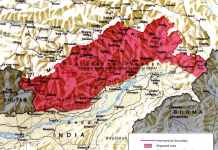The human rights violations in Pakistan administered Kashmir is also quite rampant according to the latest UN report. The UN report also blasted India for human rights violations in Indian Jammu and Kashmir, a move which was lauded by Pakistan.
Pakistan Lauds UN Report on Kashmir Calling For Right To Self-Determination
“While we appreciate the report’s efforts to document the human rights violations in Jammu and Kashmir, we would like to reiterate that there is simply no parallel between the horrendous human rights situation in Jammu and Kashmir and the prevailing environment in Azad Jammu and Kashmir (Pakistan administered Kashmir) and Gilgit-Baltistan,” a statement issued by the Foreign Office in Islamabad said.
Last year, OHCHR had released its first-ever report on Kashmir, documenting gross Human Rights Violations on both sides of Kashmir by India and Pakistan and urging action to reduce long-standing tensions. In a follow-up report released today, the rights office said: “neither India nor Pakistan have taken any concrete steps to address the numerous concerns raised”.
UN Says Violations, Torture, Detentions Rampant in Kashmir; India Slams UN Report
Pakistan welcomed the 2018 findings even though the UN said obtaining information about Pakistan administered Kashmir was difficult given restrictions on freedom of expression and information. “No steps have been taken to resolve the main issues, including a number of highly problematic legal restrictions,” the rights office said on Monday.
Human Rights Violations in Pakistan-Administered Kashmir – UN Report
In its response to OHCHR’s observations in the June 2018 report, the Government of Pakistan maintained that the constitutional and legal structures of Azad Jammu and Kashmir and Gilgit-Baltistan adequately protect the rights of its citizens. However, OHCHR’s
monitoring and analysis found that these concerns remain. Both regions introduced constitutional changes but failed to address the main elements that restrict the full enjoyment of all human rights for people living in these regions.

OHCHR highlighted that the Interim Constitution of Azad Jammu and Kashmir places several restrictions on anyone criticizing the region’s accession to Pakistan, in contravention of Pakistan’s commitments to uphold the rights to freedoms of expression and opinion, assembly and association. However, the amended Interim Constitution of 2018 has retained the clauses that directly contravene international human rights law.
It explicitly continues to state, “[N]o person or political party in Azad Jammu and Kashmir shall be permitted to propagate against, or take part in activities prejudicial or detrimental to, the ideology of the State’s accession to Pakistan.” Azad Jammu and Kashmir’s electoral law has not been amended, and it continues to disqualify anyone running for elected office who does not sign a declaration that says, “[I] have consented to the above nomination and that I am not subject to any disqualification for being, or being elected as a member of the Legislative Assembly and in particular I solemnly declare that I believe in the Ideology of Pakistan, the Ideology of State’s Accession to Pakistan and the integrity and sovereignty of Pakistan.”
Authorities in Gilgit-Baltistan also failed to amend similar provisions in the region’s governance rules that restrict the rights to freedoms of expression and opinion, assembly and association. The Government of Gilgit-Baltistan Order 2018 and the updated Gilgit-Baltistan Governance Reforms 2019 retain the same language limiting freedom of association from the Gilgit-Baltistan Empowerment and Self-Governance Order 2009.
Members of nationalist and pro-independence political parties claim that they regularly face threats, intimidation and even arrests for their political activities from local authorities or intelligence agencies. They said often threats are also directed at their family members including children.
In November 2018, 19 activists of the Jammu and Kashmir Liberation Front were charged with “treason” for organising a rally in Kotli area of Azad Jammu and Kashmir. Protesters raised slogans that called on India and Pakistan to demilitarize and leave Kashmir. On 15 March 2019, 30 members of the Jammu Kashmir National Students Federation were arbitrarily detained by Pakistani law enforcement agencies while protesting at the Rawalpindi Press Club in Rawalpindi.
Journalists in Pakistan-Administered Kashmir continue to face threats and harassment in the course of carrying out their professional duties. According to the Committee to Protect Journalists (CPJ), an anti-terrorism court in Gilgit-Baltistan sentenced journalist Shabbir Siham in absentia to 22 years in prison and fined him 500,000 Pakistani Rupees (USD 4,300) on charges of defamation, criminal intimidation, committing acts of terrorism, and absconding from court proceedings.
On 21 November 2018, Gilgit-Baltistan authorities arrested journalist Muhammad Qasim Qasimi after he engaged in a verbal argument with a local police official. According to the International Crisis Group (ICG), Pakistani intelligence officials have also warned journalists in Gilgit-Baltistan against criticising the ChinaPakistan Economic Corridor (CPEC) projects.
Several major projects have been proposed in Gilgit-Baltistan under CPEC, which is seen as a major infrastructure development boost for the region. According to ICG, the people of Gilgit-Baltistan are resentful because they feel CPEC projects were “designed and implemented without their input” and “will be of little benefit to them”. ICG concludes, “the state’s response to local dissent and alienation has been an overbearing security presence, marked by army checkpoints, intimidation and harassment of local residents, and crackdowns on anti-CPEC protest.”
A key concern in both Azad Jammu and Kashmir and Gilgit-Baltistan is that the local communities do not control natural resources of the territories as these are controlled by Pakistani federal agencies. Political leaders and activists feel their natural resources are
exploited for the benefit of Pakistan while the people of Azad Jammu and Kashmir and Gilgit-Baltistan continue to remain largely impoverished.
Authorities in Gilgit-Baltistan continue to use the Anti-Terrorism Act 1997 (ATA) to target political activists, human rights defenders and student protesters. Authorities in Gilgit-Baltistan frequently clamp down on any anti-CPEC dissent with the ATA and 2016 cybercrimes law. Anyone who protests or criticises CPEC is termed as “anti-national and anti-people”.
In the June 2018 report, OHCHR drew attention to the provision in AJK’s Interim constitution that, similar to Pakistan’s Constitution, defines who is a real “Muslim” and uses this definition to discriminate against the minority Ahmadiyya community. The amended Interim Constitution of 2018 has made no changes to this discriminatory provision. Human rights lawyers and activists informed OHCHR that Pakistan’s blasphemy provisions continue to be in force in Azad Jammu and Kashmir and Gilgit-Baltistan.
OHCHR has received credible information of enforced disappearances of people from Pakistan-Administered Kashmir including those who were held in secret detention and those whose fate and whereabouts continue to remain unknown. In almost all cases brought to OHCHR’s attention, victim groups allege that Pakistani intelligence agencies were responsible for the disappearances. There are fears that people subjected to enforced
disappearances from Pakistan-Administered Kashmir may have been detained in military-run internment centers in Pakistan.
In May 2018, the Government of Pakistan advised the Supreme Court of Pakistan that 1,330 people were being held in various internment camps and that it required more time to furnish the Court with details of the legal proceedings against them. OHCHR has been informed that there are likely several other cases of enforced or involuntary disappearances in Pakistan-Administered Kashmir but they do not get reported like in rest of Pakistan due to the lack of independent media or independent human rights groups working in these areas.
The United Nations Working Group on Enforced or Involuntary Disappearances has received at least one case of a Pakistani national disappeared from Azad Jammu and Kashmir and a permanent resident of Gilgit-Baltistan disappeared from Pakistan.




